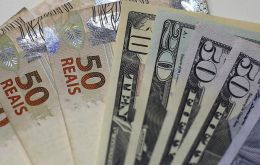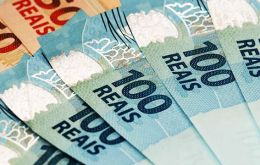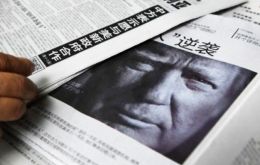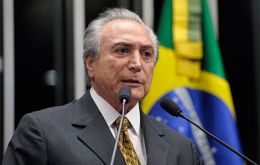MercoPress. South Atlantic News Agency
Tag: Real currency
-
Monday, December 30th 2024 - 10:58 UTC
Hard times ahead for Lula and Brazilian Real, the most devalued currency in 2024

US dollar expectations in the Brazilian market are beating forecasts having reached R$ 6.30 in December, (from 4.85 in January 2024) making the Brazilian Real one of the largest currencies of emerging countries, as the most devalued during 2024, despite the Central Bank pumping some US$ 17 billion to the market hoping to contain the slide.
-
Friday, November 29th 2024 - 10:24 UTC
Brazil's devaluation hits all-time high exchange rate

The US dollar fell an iota short of crossing the R$ 6 barrier after measures announced by the Brazilian Government of President Luiz Inácio Lula da Silva raised uneasiness in South America's largest country Thursday. The local currency has fallen 23.4% this year and 3.36% this week alone.
-
Wednesday, February 8th 2023 - 17:25 UTC
Brazilian minister denies single currency: no death sentence for the Real

Argentina and Brazil are looking at ways to stimulate bilateral trade and investments but not eliminate their own currencies, according to Brazilian Finance Minister Fernando Haddad, who played down the idea of a single shared currency between the two Mercosur partners.
-
Saturday, October 31st 2020 - 07:51 UTC
Brazil's central bank intervenes twice in the week in support of the weakening Real

Brazil's central bank intervened in the foreign exchange market on Friday, selling dollars to ease heavy downward pressure on the real that had pushed the local currency closer to its all-time low against the dollar struck earlier this year.
-
Friday, August 16th 2019 - 12:55 UTC
Brazil's central bank will sell dollars in the spot currency market; first time in a decade

Brazil’s central bank announced it would sell dollars outright in the spot currency market this month for the first time in over a decade, changing its regular market operations in response to rising demand for liquidity.
-
Thursday, July 4th 2019 - 08:02 UTC
Brazil's currency Real turned 25 this month, a true feat for a country whipped for decades with inflation

Brazil’s Real turned 25 years on Monday, July first. It’s already the longest circulating currency in the contemporary history of Brazil, having achieved this feat without fanfare in 2018 when it surpassed the cruzeiro.
-
Friday, September 21st 2018 - 08:42 UTC
Brazil stocks lower but the Real currency recovered against the US dollar

Brazil stocks were lower after the close on Thursday, as losses in the real estate, industrial and financial sectors sectors led shares lower. At the close in Sao Paulo, the Bovespa index lost 0.01%.
-
Friday, August 10th 2018 - 06:51 UTC
Brazil and Argentina markets hit by domestic and overseas uncertainties

Major Latin American currencies fell against the dollar on Thursday as global trade tensions strengthened the greenback and political uncertainty in Brazil and Argentina. Latin America's largest economy heads into a presidential election in two months time and in Argentina a major corruption scandal is unfolding.
-
Tuesday, January 31st 2017 - 21:03 UTC
Brazilian government is “meeting its budget deficit”, says minister Meirelles

Brazil's central government registered a primary budget deficit of 154.255 billion reais (US$49.40 billion) in 2016, meeting its target but recording a third consecutive annual deficit that reflects the dire state of the country's finances. In December, the country posted a primary deficit of 60.124 billion reais (US$19.25 billion).
-
Monday, August 15th 2016 - 07:19 UTC
Brazil concerned about the 25% surge of the Real against the US dollar

The Brazilian Real weakened further on Friday after interim President Michel Temer showed concern over currency strength, while stocks edged lower following a heavy batch of quarterly results including state controlled oil company Petrobras.
